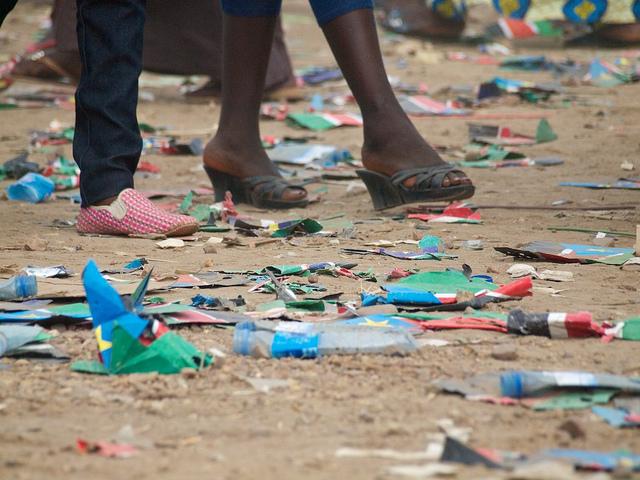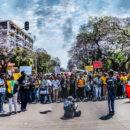Why elections may be the only answer for South Sudan

The peace agreement won’t be implemented under the current leadership. And the escalating fighting in Juba highlights the danger of continued inaction.

On the 5 year anniversary of its independence, South Sudan’s peace is looking fragile. Credit: Gregg Carlstrom.
Five years ago today, over 100,000 South Sudanese from all walks of life gathered at Dr John Garang’s Mausoleum in Juba, the nation’s capital, to celebrate the independence of their country from Sudan.
It was a dream come true for South Sudanese who had long suffered marginalisation and extermination at the hands of successive Northern regimes, which sought to Islamise and Arabise them.
In December 2013, however, the joy of newfound freedom quickly turned into a horrible nightmare. The fledgling republic descended into ugly spasms of violence that quickly turned into civil war.
As Hilde Johnson, former Special Representative on South Sudan to the UN Secretary-General, narrated in her recent book, South Sudan: The Untold Story, the civil war was avoidable but was inflicted upon the people by the irresponsible leadership and blind ambition of the chief protagonists: President Salva Kiir and his deputy (turned rebel leader, and now deputy again) Riek Machar.
After nearly two years of fighting, a power-sharing peace agreement was signed in August 2015. This led to a partial establishment of the Transitional Government of National Unity (TGONU). But South Sudan is still far from peace.
The implementation of the agreement has been slow and recently stagnated due to the lack of political will. The legislature and judiciary are yet to be reconstituted. Encampment sites for Machar’s forces in Greater Equatoria and Greater Bhar El Ghazal are still to be identified. And the issue of Kiir’s unilateral decree to divide the country into 28 states, in place of ten states recognised in the peace agreement, remains outstanding among others.
In the meantime, the economy continues to deteriorate, with inflation soaring to over 300%. Around the country, new militia groups have cropped up, such as the ones that recently attacked Raja and Wau. The tensions that led to the conflict in 2013 are building up again at a time the regional and international pressure that led to the signing of the peace agreement is waning.
And just yesterday, heavy gunfire rocked Juba and reportedly led to scores of deaths after a fight broke out between the guards while the president and the first vice president were in a meeting at the presidential palace. While the circumstances that led to the fighting are still unclear, this was just the latest deadly skirmish that the two forces have engaged in over the last few days.
[See: 5 years on, South Sudan is at a critical juncture…again]
Deadlock
The most obvious way out of these self-inflicted wounds is for the 2015 peace agreement to be sincerely and urgently implemented. But despite some encouraging signs recently that Kiir and Machar had reached a consensus on how to resolve outstanding issues, no meaningful progress has since emerged.
Furthermore, even if South Sudan’s leaders do demonstrate commitment to the agreement, the chance the reforms will actually be implemented are slim. The TGONU lacks the resolve to tackle the endemic corruption that has evaporated the trust of South Sudanese in their government since 2005. The security and justice sector reforms imagined in the agreement are unlikely to be commenced. And there is a limited chance the Disarmament, Demobilisation and Reintegration agenda will be moved forward.
Much of this impasse relates to the chicken-and-egg problem in South Sudan. That is to say, key reforms are essential to allow the country to recover from the poor governance it has endured for more than a decade; yet such reforms cannot be implemented without an effective and committed leadership. And assuming the current political elites will implement the necessary reforms would be profoundly naïve as the prevailing situation is essential to their grip on power.
A new approach
Given their unwillingness and inability to effect change, continuing to impose the current coalition leadership on the country at this crisis moment may inadvertently trigger the disintegration of South Sudan. And as such, it is crucial to initiate discussions on other options for preventing total state failure. Instead of waiting to be awakened by massacres and humanitarian catastrophe again, we must pre-emptively consider a way to prevent “the war of all against all”.
Such a new approach could require abandoning the ambitious reforms envisioned in the peace agreement and instead initiating a minimal programme of action aimed, first and foremost, at restoring legitimacy to the country by holding elections within one year.
Fundamental elements of such a programme could include constitutional amendments that would trim down the excessive executive authority and guarantee essential freedoms.
It could also include placing the electoral body under the supervision of the international community for it to be fair and credible.
And it could further involve a role for the international community in providing basic funding to prevent the economy from collapsing. Because of pervasive government corruption, provisions could be made to have the bulk of this money flow through international and national NGOs and communities with the aim of minimising hunger and encouraging a people-led reconciliation process at the grassroots.
The only way forward
Many South Sudanese do not consider the TGONU a legitimate authority by any standard. Likewise, many do not see Kiir and Machar as legitimate leaders. Nevertheless, South Sudanese agreed to give the TGONU, Kiir and Machar a chance if that would lead to peace.
Since forming the transitional government, however, the leaders have shown no interest in solving any of the existential problems that face South Sudan. The aspirations of South Sudanese to live in peace and build an effective state have been shelved.
The international pressure that brought the agreement to birth could be redirected at moving its implementation forward. But if the leaders have no interest in the agreement, it is hard to imagine how it can be properly and genuinely implemented. And given this, it would be better if urgent alternative arrangements be made so that the country can hold elections within a year to regain a degree of legitimacy and new leadership.
If South Sudanese, whose future is being mortgaged by their leaders, join hands with the regional and the international community, such arrangements can be made.
At this point, this may be the only way forward. As the recent fighting in Juba underlined, any further inaction risks the disintegration of South Sudan.
Peter Biar Ajak is a 2015 Millennium Fellow at the Atlantic Council and a 2016 Archbishop Desmond Tutu Fellow at the African Leadership Institute




I have heard Mr Ajak repeat similar arguments when he shared a panel with Hilde F.Johnson ,Clare Short and others at the SOAS launch of Hilde Johnson’s book.
To suggest “abandoning the ambitious reform” ideas is a surprising approach from someone who calls for change!
Reform is necessary.It should include what Hilde Johnson wrote about her attempts to draw attention to the significance of changing the name. SPLA still stands for Sudan(not South Sudan)Peoples Liberation Army.This helps those who reject DDR(disarmament,demobilisation and reintegration)because for them the struggle will only over when the whole Sudan is subdued.
Moreover,the problem is not generational .To lose hope in a whole generation and wait for the next group of young “pure” leaders to take the helm is naive.Younger people can also be inefficient or corrupt or easy to manipulate by foreign powers.
The latest fighting took place by leaders while the President and Dr Machar were together.It shows that they do not have full control over their troops(most of whom were never trained in professional army discipline ).The rogue leaders should be marginalised.
As a Sudanese ,I would also like to remind Mr Ajak that the two civil wars have decimated the economy,hampered development of the periphery and killed or maimed incalculable numbers.
“Extermination” is not an accurate word to use.It is true that efforts to Islamise and arabise were undertaken;but it is also true that colonial missionaries exerted efforts to wipe out the identity,religion and languages of the Southern Sudanese .
The way forward in South Sudan is to insist on reform;help UNMISS to protect civilians ,act as a buffer between the warring groups and push for elections with AU and other observers .
I do agreed with Kalid Almubarak. Avoiding to solve the problem now is not solving it, but postponing it. Which means it will still be a problem even in the future. Postponing ambitious reform as articulated in the ARCSS is not a solution, You are only postponing them as problem For later time.
The essence of bad governance and resulting instability is caused mainly by Lack of social contract between the Political Nation State on one hand and on other the Traditional Commune Federal Systems (TCFS) of governance popularly known as kingdoms and chieftains. TCFS of governance should be more important in future inclusive, just governance with more federal powers brought to the communities in their TCFS. The current trend of Greater Bahr Ghazal, Greater Equatoria and Greater Upper Nile geopolitics could be recognized in the Trio-Presidency and the rotational leadership that is responsive to diversity. More administrative states may be needed beyond the existing 28 administrative states. But it should be considered that Administrative States shall be a conduit between the Political Federal Nation State and the Local Government of County and Payam. Boma in form of chieftains should be considered the lower constituent unit closer to the Peoples.
The inevitable liberation and military nostalgia shall one time come to an end as new forms of leadership may take over through the commissioners and governors. This may take it need course and length of time depending of changing contexts and demands under unity in diversity. It is then that the evolving geopolitical and trio but rotational and apportioning leadership could emerge into rotational presidency.
Taking towns to rural Peoples through recognition of TCFS as mandated by articles 166,167, 168 and 169 of SSTC should be supported to promote unity in diversity through mutual recognition and social cohesion in multinational and multicultural South Sudan. This should be geared towards more federation and recognition of TCFS. Please Google a research report: The Roles of Traditional Authority Leaders in Taking Towns to Rural Peoples in South Sudan.